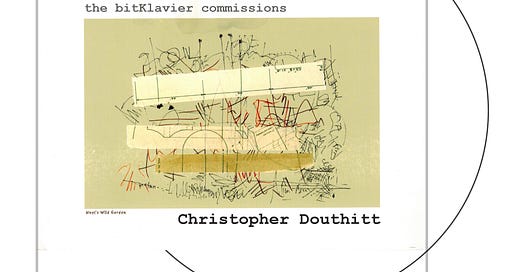For the penultimate bitKlavier Commission, we have the composer, singer-songwriter, theorist, electronic musician, and teacher Christopher Douthitt. Even today, where many composers engage in a lot of different sort of work, Chris stands out for his range, whether it be writing for vocal consort, coding up a digital instrument, cultivating his unique songwriting, or writing an academic paper. I have also always been drawn to the intensity and focus of his work, a sense of depths that might take persistent effort to plumb, in the best possible way.
The following are words by Chris about his bitKlavier Commission, “Sleepers, Walk:”
I think of “Sleepers, Walk” as a tribute to the slog. The trudge. The plodding path forward. It’s a chord progression whose initially transparent voicings gradually ascend and compress until they collapse in a tumbling chromatic mess. It’s a long, slow crescendo with an abrupt drop-off. To me, the climactic point is a little hard to absorb (there are a lot of notes), but it’s hard to absorb in a way that almost seems like relief: I feel like I’m listening through the storm of too-muchness in order to hear the empty space on the other side.
This version of “Sleepers, Walk” for solo bitKlavier is the second of three instantiations of the underlying music. The first “Sleepers, Walk” was written for the early music group Sonnambula and was scored for three bass viols and harpsichord. That version sketched out the basic form and harmonic structure of the current piece, and it took on the image of sleepwalking—originally a reference to the group’s name and to Bach’s famous cantata Sleepers Awake, one of the first pieces of classical music I remember skipping ahead to on a CD (it was on a “music for relaxation” compilation I bought at Costco as a kid).
The bitKlavier “Sleepers, Walk,” revives this previous material. bitKlavier transforms the original notes and rhythms into something more environmentally vivid and dangerous—the Nostalgic swells feel to me like heavy-limbed movement, and the detuned Synchronic echoes feel like confusion, or like the pings of a beacon shining through the fog. The timing and layering of these sounds are difficult to manage, and Adam does a mind-bending job navigating the slowly unfolding crescendo and accelerando on which the piece depends.
“Sleepers, Walk” for bitKlavier, by Christopher Douthitt, performed by Adam Sliwinski
The third version, called “We Move Through Sinking,” further explores the idea of a chord progression as an opaque, dense environment; it is a multichannel fixed media art song that uses the bitKlavier piece as an accompaniment to an electronically manipulated cloud of voices.
“We Move Through Sinking” for voice, bitKlavier, and vocodec
I’m incredibly grateful both to Dan for the opportunity to make this piece and to Adam for the time, attention, an sensitivity he poured into its performance. For a non-piano-player like myself, bitKlavier is revelatory—I feel like it plugs directly into my musical imagination and unlocks a mode of pianistic expression that had previously seemed beyond reach.
Thank you Chris!!
Check out the score…
… and bitKlavier gallery for “Sleepers, Walk.”






